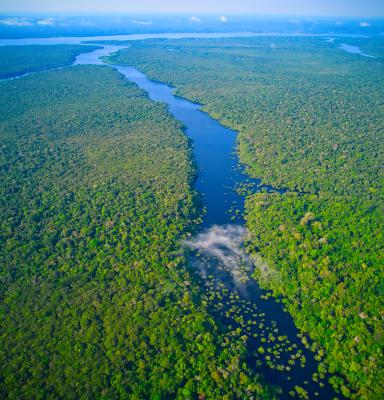
What is it about?
The FSC Amazonia 2025 Business Meeting is holding its 3rd edition this year and is part of a series of events organized by FSC to support sustainable trade in the tropical timber value chain. Other examples include the FSC Asia Business Encounter, Carrefour du Bois (Nantes) Business Encounter, and FSC Amazon Business Encounter 2024. The business meeting concept brings together professionals along the tropical timber value chain and provides the opportunity to discuss global supply chain challenges, while strengthening and maintaining relationships between suppliers and buyers.
In 2024 there was the second FSC Amazônia Business Meeting and it was held in Belém, Brazil. During this event, FSC brought together more than 80 different stakeholders from the Amazon timber supply chain. And in the year 2025, the event will take place in Manaus and will address a series of important topics, including:
- FSC certification aligned to EUDR
- New FSC standard and new opportunities
- Updates on Export Regulations: Following the Implementation of CITES in Brazil
- Tropical Timber Market Overview
- Matchmaking Session
Who can participate?
We are inviting professionals involved in the trade of tropical timber and timber products between Brazil and the EU, including forest managers, sawmills, traders, importers, manufacturers, end users, consultants and industry organisations.
Our goal is to receive up to 100 participants, so please register as soon as possible. Vacancies will be filled in order of registration and we will have a limit of 2 people per institution.
Context
If Europe had sourced 100% of tropical wood products verified as sustainable, this would have positively impacted more than 16 million hectares of natural and semi-natural tropical forests and significantly reduced CO² emissions in 2020. This data comes from an extensive study by the Probos Foundation, which also highlighted that in 2021, only 31% to 36% of Europe's tropical timber imports came from sustainably managed forests.
The Amazon Basin covers a staggering 6.7 million square kilometers (roughly twice the size of India) in South America, with nearly 60% of the rainforest located in Brazil and the rest distributed among eight other countries. A wide range of policies, strategies, laws and regulations have been developed to facilitate forest governance and achieve sustainable forest management.
Recently, Brazil announced plans to establish new forest concessions, strategically aimed at improving sustainable forest management practices and conserving biodiversity. "Concession rights are one of our best tools to protect Brazilian forests from deforestation and safeguard social rights. That is why the Brazilian Forestry Agency plans to expand the current concessions from 1.6 million hectares to 5 million in the next 5 years," said Renato Rosenberg, Director of Concessions, in 2023.
In addition to state forest concessions, privately owned forest management units play a crucial role in the sustainable management of the Amazon rainforest. As of July 2024, 9.53 million hectares of natural and planted forests in Brazil had already been certified by the FSC certification system.
Brazil is the world's second-largest exporter of tropical logs and the third-largest exporter of tropical lumber, with Europe being a key export market for these products. In 2020, the EU27+UK imported 150 tons of logs, 196,200 tons of lumber, 4,000 tons of plywood and 200 tons of wood veneer. This makes Europe one of Brazil's top three export partners, along with the U.S. and China.
Market requirements in the EU and the UK, shaped by consumers' environmental awareness, sustainable public procurement policies, industry norms, and regulations such as the EUDR and CSDR, present new opportunities and challenges for those involved in the production, trade, and utilization of tropical wood products.
As mentioned earlier, a vast area of forest needs to be protected from illegal logging, hunting, and land conversion. At the same time, local governments, NGOs and forest management organisations are making great efforts to enforce environmental laws, empower indigenous peoples and ensure safe working conditions. Sustainable trade with the EU and demand for FSC-certified products support these efforts.
Contact
If you have any questions about this event, please contact Yuri Alves (FSC Brazil) at yuri@fsc.org.br or Tijmen Hennekes (FSC Netherlands) at t.hennekes@nl.fsc.org (FSC International).
Schedule
TBD
Panelists
TBD
